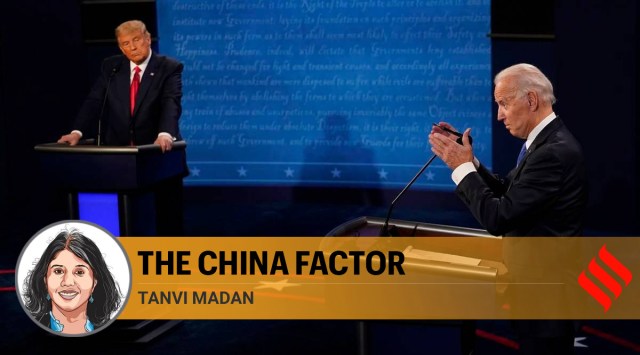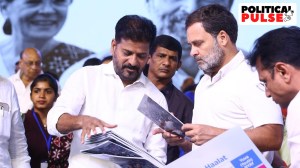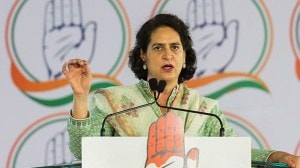- India
- International
For Delhi, US election result is consequential in terms of how the next administration approaches China
Delhi will need to consider what America’s choice on November 3 will mean for American power and purpose — because assessments of that could determine how Beijing decides to act in the region and globally.
 In this Oct. 22, 2020, file photo Democratic presidential candidate former Vice President Joe Biden answers a question as President Donald Trump listens during the second and final presidential debate at Belmont University in Nashville, Tenn. (AP Photo/Morry Gash, Pool, File)
In this Oct. 22, 2020, file photo Democratic presidential candidate former Vice President Joe Biden answers a question as President Donald Trump listens during the second and final presidential debate at Belmont University in Nashville, Tenn. (AP Photo/Morry Gash, Pool, File)A significant amount of the commentary in India about the upcoming US presidential election’s impact has focused on what Donald Trump and Joe Biden have said or not said about Kashmir. However, that misses a crucial point: Broader foreign policy decisions will have more significant implications for India. Particularly consequential will be how a second Trump administration or a Biden administration perceive and approach China and, relatedly, the question of America’s role in the world. The outcome will depend on not just who wins in November, but also the choices that the next American president makes on key personnel and policies.
For the Indian government, the Trump administration’s more hawkish view of China has been welcome. It broadly converges with Indian concerns about a rising China’s actions and intentions. And it has facilitated, if not driven, the Trump administration to assign India an important role in its strategic framework, including through the Free and Open Indo-Pacific concept. This, in turn, has laid the basis for defence and security cooperation, incentivised Washington to manage differences with Delhi on trade, Russia, Iran, and human rights, and led to vocal American support for India in the ongoing crisis with China. Moreover, while India prefers a subtler approach to highlighting Beijing’s malign behaviour, the administration’s more explicit one — and the tools it has as its disposal — has put a global spotlight on Chinese assertiveness.
However, there are aspects of President Trump’s China approach that have caused consternation in Delhi. There has been a persisting concern about Trump striking a deal with Chinese leader Xi Jinping since the Mar-a-Lago summit in April 2017. The administration subsequently pivoted to competition with China that summer. But questions have remained about whether the competitive approach to China has sufficient presidential buy-in or is more the result of certain Trump administration officials’ preferences. These doubts have been fuelled in part by Trump’s statements about his “very, very good friend” Xi, as well as his reported willingness to look the other way on developments related to Hong Kong, Xinjiang and Huawei/ZTE.
The other aspects of Trump’s China approach that have given Delhi pause are its ideological dimensions, as well as responses like tariffs that have hurt India too, and American withdrawal from international institutions and agreements that has served to benefit Beijing.

Moreover, the China prism has had its limits — it has not, for instance, resulted in concessions to India on trade and immigration.
If Trump wins, India will carefully consider three elements: Whether Trump stays the course or again pivots on China, which officials remain in or join the administration, and how Beijing responds to a Trump victory.
Delhi will also watch China policy closely if Joe Biden wins. The former vice president is no stranger to foreign policy or Xi. Commentators have noted his recent, more hardened view of China. He has called Xi “a thug” and written about “the need to get tough on China”. His campaign has laid out specific steps it will take vis-à-vis Tibet and Taiwan, and talked of a “genocide” in Xinjiang.
And there is recognition among most Democrats that the US-China relationship today is different from what it was in 2009, 2012 or 2016. An Obama administration China hand noted that opinion in the US on approach to China has “moved from balancing co-operation and competition, to competition and confrontation”.
But what a Biden administration sees as the terms of strategic competition with China and how it might choose to blend in cooperation will have implications for India. And there is a debate on this among Biden’s advisors — one that will likely continue. Its outcome will depend in part on the president’s views, who holds key foreign and economic policy positions, as well as Beijing’s approach.
Delhi will closely watch how this debate plays out and how Biden might respond to any overtures from Beijing. It will particularly worry about any signs that Washington would be willing to limit competition or criticism in return for Chinese cooperation on certain administration priorities. More broadly, it will look at whether Biden administration’s Asia policy derives from its China policy or vice versa.
Other aspects of Biden’s preferred approach might suit India. For instance, acting collectively with allies and partners rather than unilaterally, not imposing tariffs that hit allies and partners along with China, and recommitting to international organisations in ways that could blunt Chinese influence. Delhi might also broadly approve of — and could benefit from — the 3Ds of a Biden foreign policy that former Obama administration official Anne-Marie Slaughter has outlined: Domestic (renewal), deterrence, and democracy.
Linked to the China question is how the debate on America’s approach to the world will play out in the next few years. If a re-elected Trump’s instincts on alliances, immigration and trade are validated, it could mean a reduced and/or contingent American commitment in Asia, fewer opportunities for Indians in the US, and tougher demands on Delhi to secure a trade deal. If a Biden administration sees engagement with China on climate change, global health security and non-proliferation as a priority, has a transatlantic emphasis at the expense of an Asian one, and sets certain standards for its democratic partners, that will complicate the Indian government’s options and require adjustments.
Moreover, with either Trump or Biden, foreign economic policy choices (for example, resilience and recovery through diversification or reshoring) and budgetary ones (for example, spending at home versus abroad) will have crucial implications for India.
Finally, Delhi will need to consider what America’s choice on November 3 will mean for American power and purpose — because assessments of that could determine how Beijing decides to act in the region and globally.
This article first appeared in the print edition on October 26, 2020 under the title “The China factor”. Madan is Senior Fellow at the Brookings Institution, and author of Fateful Triangle: How China Shaped US-India Relations During the Cold War
EXPRESS OPINION
More Explained
Apr 27: Latest News
- 01
- 02
- 03
- 04
- 05











































